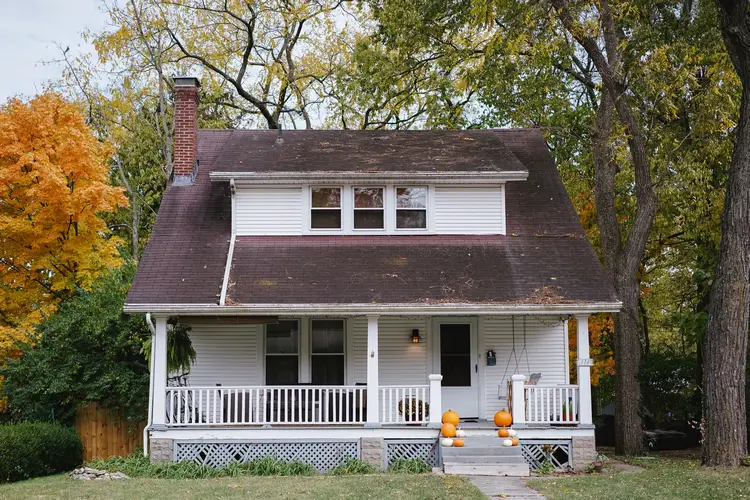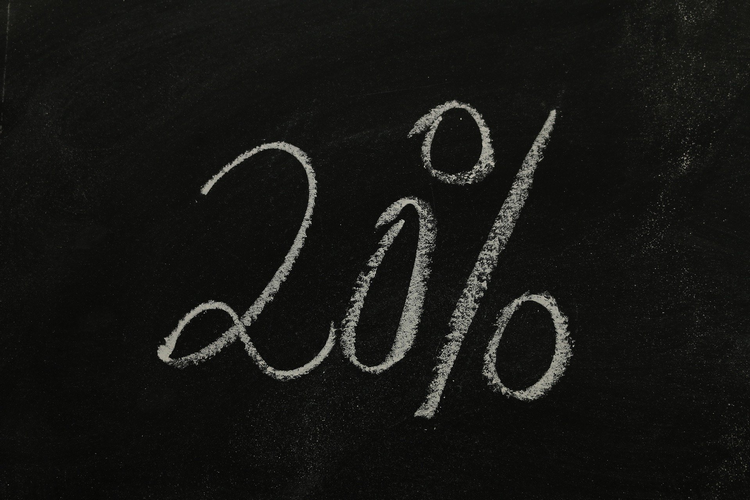
As a property investor I don’t think twice about putting in a cheeky offer on a house. But it’s different if you’re buying a house for yourself when it’s an emotional purchase. What % is a cheeky offer on a house is totally subjective.
So what % is a cheeky offer on a house and is it OK to offer less than asking price? An offer of more than 10% below asking price is considered a cheeky offer. But an offer on a house of 25% below asking price is considered a lowball offer. The percentage of cheeky offer achieved during negotiations depends on who has the upper hand and if its a buyers or sellers market.
Please also read this article to discover how you could save £71,475 on your next mortgage if you sell your house and rent before buying again. Even I was amazed when I did the calculations!

How much should you offer on a house below asking price and when does it become cheeky?
Always start negotiations with an offer based on a percentage of asking price of 90% or less. The percentage of asking price to offer below market depends on how much you want the property vs how much the seller wants to sell. Is the seller motivate to sell is what you need to know?
You won’t always know how strong their desire is to sell or if it’s higher than yours to buy until you put your offer in. That’s why I recommend cheeky offers!

An emotional purchase will make cheeky offers more difficult?
When you’re buying a house for yourself and the purchase is an emotional buy it’s much more difficult to put a cheeky offer on a house. But probably the biggest factor affecting negotiations is the seller (or vendor) and the estate agent acting for the seller.
At the end of the day, the estate agent is working for the seller. Which means they shouldn’t really reveal to you how low the vendor is prepared to drop on price.
But many estate agents break this golden rule (see below on how you make an offer).
Whilst it’s consider that 10% is a cheeky offer on a house, there’s nothing stopping you from offering anything you like. If you always bear in mind that the property’s asking price is not its valuation. The asking price is the starting point for negotiations. Always remember this when you consider what % is a cheeky offer on a house.
The offer you make boils down to how much the property is worth to you. But it is also down to how much the vendor wants or is prepared to take. But is also how willing you are to negotiate hard, as not everyone is prepared to do this.
Whether or not you come to an agreement on the price the buyer is willing to accept depends on many factors. But in the end it may mean meeting in the middle for a willing buyer vs a willing seller.
So in reality a cheeky offer could be 20% or 30%, or more. It just depends on how the offer that’s made is interpreted by the vendor.

When is a cheeky offer rude or disrespectful?
When you look at the meaning behind the term ‘cheeky‘, according to the Cambridge Dictionary, it means “slightly rude or showing no respect.”
Which if you take this definition to is literal meaning, you can understand why often times cheeky offers can be met with an unhappy seller. It’s all down to interpretation.
The level of unhappiness as a result of a cheeky offer can extend to having sellers even refusing to deal with you after making what they could refer to as a disrespectful offer.
This is why I would advise caution on this point. If you’ve just spent the best part of a few months looking for your perfect new home.
If this is your dream home you need to tread carefully. Especially if it’s to the extent you’d be very disappointed to not secure the house. Then I suggest that a cheeky offer of 10% or more could risk rejection. And possibly even alienating the seller.
Sometimes if you want to be taken seriously, then a reasonable offer is required.

So is it rude to offer less on a house?
Whether it’s deemed as rude to offer less on a house is down to perception. Some sellers consider it rude to receive low offers, whilst others expect it. The longer a house remains unsold, the less likely a low offer will be considered as rude. Some buyers are happy to offer less than asking price and some are not.
A cheeky offer on a house could result in the seller reacting badly. This could result in them telling the agent they are not prepared to negotiate with you any more. It just depends on the person selling.
But a good saying to keep in mind is “Cheeky is a few quid above no“. The problem is how to find that level. The only true way to find out, is to start low and work your way up. But only up to a level you are happy to pay for the house.
But another saying you should consider is “if you don’t ask, you don’t get“.

The negotiation of your cheeky offer is in the hands of the estate agent
However, having said that this process is often in the hands of the estate agent. It can be about how the offer is put forward. It’s if the agent considers your offer to be cheeky or disrespectful. If they do, then they’re not going to be putting it forward in the best light. But they re obliged to put all offers forward, no matter how lowball the offer.
In my opinion it’s a part of the estate agent’s role to manage the negotiation process carefully and sympathetically. It is their job to explain offers to sellers and to coach them through any low-ball offers.
Estate agents are by law required to put all offers forward. No matter how low the offer is. So there’s nothing to prevent you from being as cheeky as you like. Which means you can put forward a very cheeky offer of 25% or more discount.
If the property you’re purchasing is not so special to you. Or if it’s an investment purchase and it doesn’t matter to you if don’t buy it. Then I’d say be as cheeky as you like.
So long as you’re prepared for the rejection and happy to walk away from the deal. In this case the amount by which you low-ball the offer is less important.

What about cheeky offers direct to vendor
If you are dealing directly with the vendor (i.e. the person selling the house), you won’t have the estate agent as your buffer. For some this is more of a difficult negotiation process.
Often times people find it much harder to put in cheeky offers when they are speaking face-to-face with the seller. With all of our property deals, it’s me that does the negotiations. My wife hates this side of our property business.
The question is; are you happy with rejection?
If you are dealing direct to vendor with your property negotiation, the same rules apply.
If this is an emotional purchase and you really want the property, this will govern how much of a cheeky offer you might make. Whereas on the opposite side of this coin is if this property is less of an emotional purchase. If it is you are more likely to put in a cheeky offer.

What affects the % level of a cheeky offer on a house?
There are a number of factors that will affect the % level of a cheeky offer on a house.
The % level of a cheeky offer on a house is affected by:
- Who’s selling the house: For example it’s more likely that a property investor will understand cheeky offers. But having said that, they are not necessarily going to accept a lowball offer.
- How desperate the vendor is for a quick sale; are they a motivated seller?: The more desperate or motivated they are, the greater the discount they’ll accept.
- The state of repair of the house: The more repairs that are required the more chance there is of a lower cheeky offer.
- The state of the property market and the property’s location: The higher the demand in the area, the less chance of cheeky offers being accepted. Versus, the lower the demand, the more chance of cheeky offers. It’s much easier to offer less on a property in a buyer’s market. But if you find a motivated seller in a sellers market you can still make a lowball offer.
- The level of emotion attached to the purchase: The higher the level of emotion attached to the purchase, the less of a chance of a cheeky offer. Compared to a non-emotional purchase, which would result in cheekier offers.
- How prepared you are to walk away from the deal: The more you are prepared to walk away, the higher the offer discount is likely to be.
- The length of time the property has been on the market: The longer a house has been on the market, the more chance of high % cheeky offers being accepted.
- The strength of bargaining position: In other words are you a cash buyer and proceedable or are you in a chain-sale. If you are a cash buyer and you’re not reliant on a sale, this puts you in a much stronger position. Cash buyers are much more likely to get away with cheeky offers.
- How much you are liked by the vendor or what’s your rapport like: This is especially true if you’re direct to vendor. But can be equally as true via an estate agent, as you’ll have met the vendor when you viewed the house. Whether your offer is accepted can turn on a coin and on how the lowball offer is put.
- Price drops beforehand: This will be shown on Rightmove or you can ask the agent. For a great tool to check price drop history on properties on Rightmove – check this article: Can you see how many times a property has been viewed on Rightmove? The link jumps to the heading: “Can you see price history on Rightmove?“
- Your level of preparedness to accept rejection: If you are happy to take no for an answer, you’ll be more prepared to be more cheeky.
- The current list price of the property: If the property is already priced low to sell you may not get away with as big a discount or lowball offer. But this boils down to researching your market first and knowing a bargain when you see one.
Can you offer 15% below asking price?
You can offer 15% below asking price if this is what you think the house is worth to you. The seller’s reaction to your low offer will depend on the seller and how long the house has been on the market.
But unless you make a high % level of a cheeky offer on a house, you won’t find the seller’s bottom line.
Making an offer on a house that has been on the market a long time
If the house has been on the market a long time this usually indicates it’s been over priced and the seller may be happy to accept your low offer.
If yours is the only offer they’ve received to date, or if there have been other similarly low offers, the vendor may begin to understand that their property isn’t worth what it’s on the market for.
In this article “can you see how many times a property has been viewed on Rightmove“, I also demonstrate how a great Google Chrome plugin let’s you the price history for a house listed on Rightmove.
Can you offer 20% below asking price?
You can offer 20% below asking price if this is what you think the house is worth. Low-ball offers like this can see sellers getting upset, but this will depend on the person and how keen they are to sell.
If the house has been on the market for a while the seller may be happy to accept your low offer.
The old saying goes, if you don’t ask, you don’t get. The vendor may be happy to have an offer, despite one that’s 20% below asking price.
Can I offer 20k less on a house?
You can offer 20k less on a house. But whether the seller accepts your cheeky offer is partly down to how big a percentage the 20k represents in relation to the asking price.
- If the house has an asking price of £100,00;, £20,000 represents a 20% reduction.
- Whereas the house is listed at £500,000; this represents a 4% below market offer instead.
The same concept applies to any other amount you’re thinking of offering below asking price.
The other factor that will determine whether the seller will accept your offer is how long the property has been on the market. This article will help you to work this out: How do you find out how long a house has been on the market.
How much to offer on a house that’s been on the market for 6 months
If a house has been on the market for 6 months or more you should definitely offer 15-20% below asking price or even more.
The fact that the house has been on the market for this time points to it being over priced. The sellers reaction to your low offer will depend on the person and how keen they are to sell.
With a house that’s been on the market for six months a low offer is a good starting point. You can always increase your bid with a second offer if you want the house.
How do you make an offer on a house?
Before you make your offer, do your homework on the area and on the type of house you’re looking to buy. Get a feel for valuations in this area before you offer.
On the assumption you are making your offer via the estate agent, it’s worth asking the question “how much is the vendor willing to take as an offer on their house?” If the estate agent is doing their job correctly they should avoid answering this question.
But as I’ve found on many occasions, estate agents can’t resist answering this question.
Estate agents are simply after their sales commission
For example:
If the house is on the market for £265,000. Then let’s say the estate agent answers with £255,000. You have already saved yourself £10,000.
The other important question to ask the agent is whether or not other offers have been made. They may tell you there have been other offers. But they are not obliged to tell you the amount.
However, if they are open about the previous offers that have already been rejected, this will give you an indication of where your opening offer should begin. But this may depend on the length of time since these previous offers.
See if you can get from the estate agent whether or not the seller is prepared to do a deal.
My suggestion is you go in lower than what the agent has suggested.
I say this for two reasons:
- The first is that whilst the agent has broken this rule, it’s unlikely they will reveal the true lowest offer the seller will accept.
- Secondly, if the agent is telling the truth about how low the seller will go. Plus if the seller is willing to take £255,000. They may be prepared to take less.
I recommend that you always begin negotiations with an offer of less than you are willing to pay. How much lower is up to you. It’s about how comforatable you feel about putting in very low-ball offers. But it’s also governed by what I’ve already explained.
It’s on a bit of a sliding scale; the higher your desirability and ‘want‘ for the house, the less you will feel comfortable about being cheeky vs the lower the desirability and ‘want‘ for the house, the more cheeky you can be.
With all property negotiations treat the vendor with respect. That means you should be looking to create a good rapport with the vendors when you visit their home. The more the sellers like you, the more chances there are of them accepting your offer vs someone else’s.
What should you do if your cheeky offer is rejected?
Assuming your cheeky offer is rejected, what should you do next? The answer to this question depends. And once again this ‘depends’ is on the level of emotion attached the deal. But also on your level of desirability for the house.
If you really want this property, you will probably need and want to go in with a higher offer. You may need to keep increasing your offer until such time as you meet the sellers lowest asking price point.
However, if you are not fussed either way if you buy the property, you may choose not to increase your offer. Or better still tell the agent or vendor your offer is left on the table.
You may find than in a few weeks or months if the house doesn’t sell, they may come back and accept your low offer.
When should you offer asking price on a house?
The time when you may have to offer full asking price on a house is for two reasons:
- If you are in competition with another buyer and you want this house. This might mean you’re prepared to go to full asking price rather than stopping at a cheeky low offer.
- If you really don’t want to lose the property and you really want the property.
When should you offer more than asking price on a house?
There are times when properties sell for more than asking price. This usually only happens in a seller’s market, which is when the are more buyers than there are sellers.
It’s when there’s more competition in the market and you find that buyers are almost fighting over each other to buy houses.
This has the effect of putting house prices up and is what often drives house price increases across the country.
I’d also suggest that you would only ever offer more than asking price if it’s a property you truly want. Otherwise you may as well wait for the next property to come along.
What conditions affect the level of cheeky offer you make?
The reality is that if you’re in a buyer’s market, you have much more of an opportunity to put in cheekier offers. Or certainly if the property you are making an offer on has been on the market for some time, this would indicate three things:
- Firstly, it could indicate the property is over-priced and ripe for a cheeky offer.
- Secondly, the seller may be more keen to sell and might be more open to cheeky offers.
But at the end of the day most vendors accept that offers will be made. The worst that happens for the most part is the vendor says no. If this is the case and you want the property, offer more and continue your negotiation.
But on the other-hand, if you’re not too fussed, leave the offer on the table and keep looking.
What would be considered a lowball offer
An offer of more than 15% below list price would be considered a lowball offer.
But before you make such a lowball offer consider the list price of the property compared to your research of the area and what the property is worth. But also are you prepared to offend the seller as is often the case with lowballing.
Please don’t forget to read this before you leave…
Please don’t forget to also read this article to discover how you could save £71,475 on your next mortgage if you sell your house and rent before buying again. As I said earlier, even I was amazed when I did the calculations!
You may also like to read about the advantages of being a cash buyer. In this article I identify the four main benefits of being a cash buyer, and I identify a strategy of how you can make this happen.
I hope you’ve enjoyed this article about what % is a cheeky offer on a house
If you’ve enjoyed this article about what % is a cheeky offer on a house please share it on your favourite social media site.
Also, if you have any questions, please feel free to comment below too. Alternatively, if you need more help, please feel free to contact us on our contact us page here. Or join the discussion and ask your question in the property forum.




